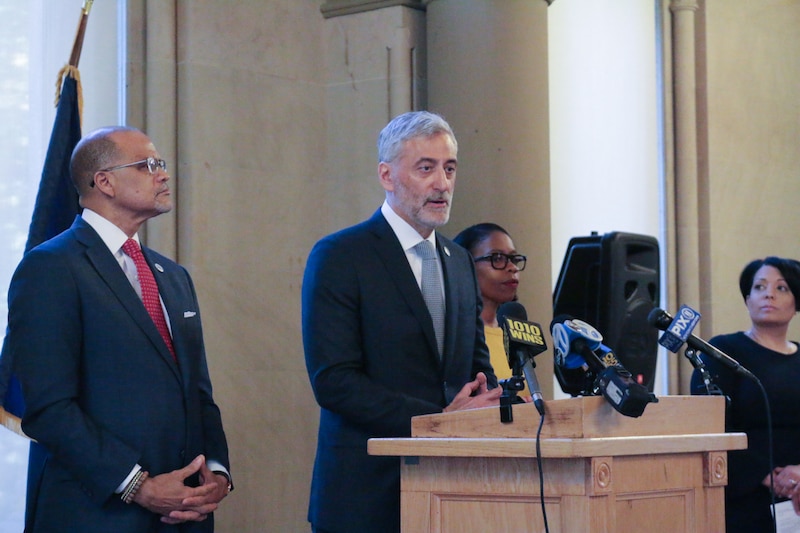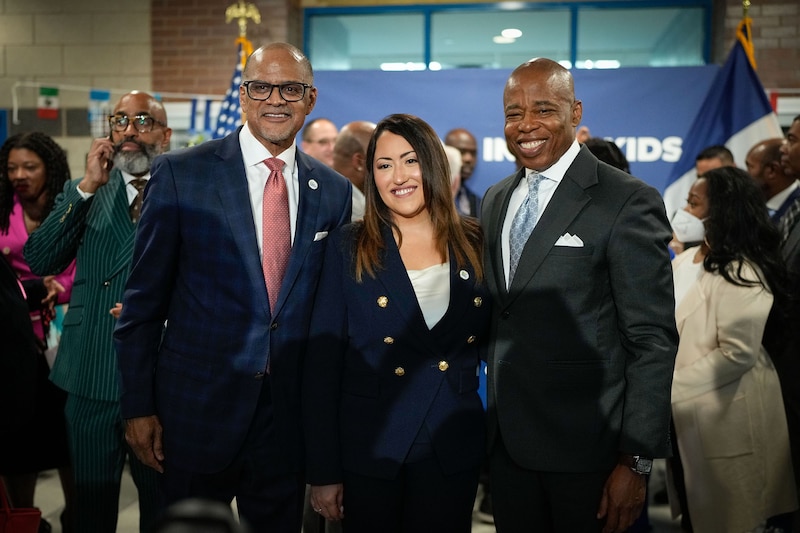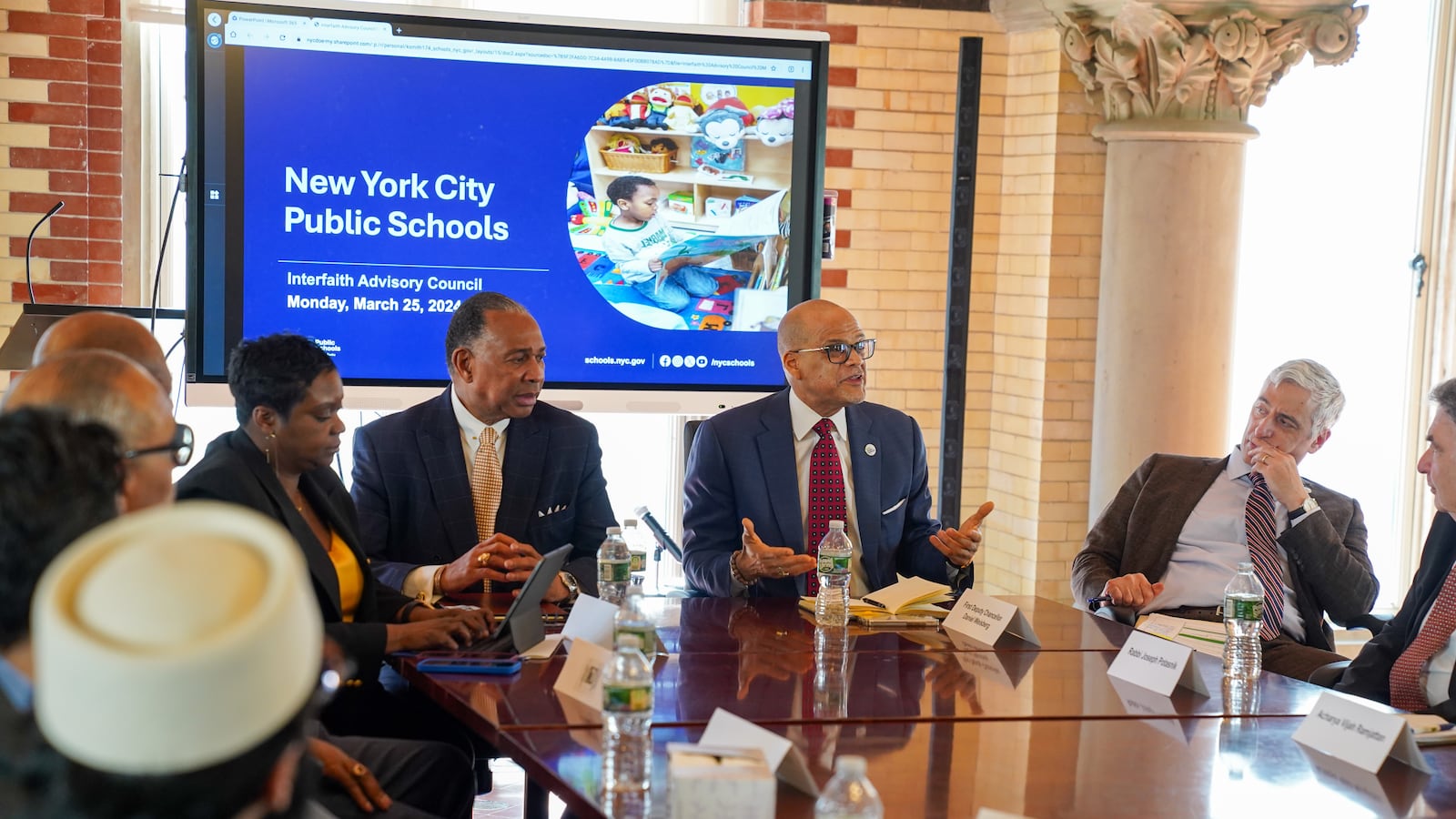Sign up for Chalkbeat New York’s free daily newsletter to keep up with NYC’s public schools.
Within 24 hours of announcing his plans to step down as New York City’s schools chancellor, David Banks flanked Mayor Eric Adams at a jubilant press conference naming a successor to run the nation’s largest school system.
Neither Banks nor Adams took credit for selecting Melissa Aviles-Ramos, a deputy chancellor, as the next schools chief. Instead, they pointed to a top aide seated in the front row who had worked behind the scenes to elevate her: First Deputy Chancellor Dan Weisberg.
The moment revealed a dynamic inside the Education Department that could prove critical to how well it withstands the crisis enveloping the Adams administration. While Banks has served as the public face of the department, Weisberg has taken the lead backstage shaping and implementing policy as his second in command.
Weisberg, 61, first joined the department as a labor negotiator during Mayor Michael Bloomberg’s administration, which favored charter school expansion and clashed with the teachers union. After leaving the department, he spent a dozen years at a national nonprofit focused on teacher quality that advanced contentious policy ideas.
He now oversees a sprawling portfolio that includes an overhaul of reading and math instruction, opening new schools, and supervising the department’s senior leadership. He also led policy discussions on hot-button issues, from reintroducing selective admissions in the wake of the pandemic to navigating complex tradeoffs stemming from a state mandate to slash class sizes.
“A lot of advocates kind of describe him as the shadow chancellor,” said Matt Gonzales, director of the Education Justice Research and Organizing Collaborative at the NYU Metro Center. “Everywhere we turn, Dan Weisberg is showing up.”
A graduate of the city’s school system, Weisberg has won admirers. Some parents and education leaders described Weisberg as thoughtful and unusually responsive for a senior official. Others bristled that he is a lawyer by training with no teaching experience who nonetheless shapes policies directly affecting classrooms. And integration advocates have been frustrated by his support for selective admissions and gifted programs, which they blame for exacerbating school segregation.
But as a raft of top officials resign from the Adams administration in the wake of an unprecedented federal indictment of the mayor, Weisberg is now responsible for maintaining stability at the Education Department — an urgent task in the weeks ahead.
Banks’ sudden departure comes just over a month after his phones were seized by federal agents as part of a sprawling probe into Adams’ inner circle. Banks, who contends the mayor pushed him out of office ahead of schedule, has not been accused of wrongdoing.
In the meantime, Weisberg must help quickly smooth the transition for Aviles-Ramos, who is taking over as chancellor months earlier than planned. And he must also help cement the administration’s signature policy initiatives so they outlast Adams, who has pledged to run for re-election but faces corruption charges, multiple federal investigations, and an uncertain future as mayor.
Even before the recent upheaval, Weisberg said the department focused on building political support for their top initiatives among parents, educators, and union officials to ensure they outlive the Adams administration.
“Sustainability is something you should always have in mind,” he told Chalkbeat. “That was true under Mayor Bloomberg. It’s true under Mayor Adams. You never know exactly how much time you have.”
A one-time union foe, Weisberg charts a new path
Three years ago, as Banks prepared to take the reins of the Education Department, he called Weisberg for advice. The pair didn’t have a close relationship, though Weisberg had long admired the Eagle Academy network of public schools that Banks helped launch to serve boys of color.
Weisberg, then CEO of TNTP, an organization focused on teacher quality, said he and Banks shared a similar sense of humor and “clicked.”
But Banks’ decision to tap Weisberg immediately raised alarms from a powerful constituency.
Michael Mulgrew, president of the United Federation of Teachers, expressed “severe doubts” about Weisberg, he said in a recent interview. One educator wrote at the time that Weisberg is “one of the most dangerous people in the country who could rise to be the second highest ranking administrator” of the city’s public schools.
Weisberg helped lead labor negotiations under Bloomberg, who saw the teachers union as a powerful roadblock to overhauling the public school system. The administration pursued ideas that often drew fierce resistance: embracing charter schools, pushing for merit pay, vowing to overhaul teacher tenure protections, and closing a raft of schools, replacing them with new smaller ones.

His role at TNTP, formerly known as The New Teacher Project, also drew scrutiny, as the organization often recommended policies that earned pushback from some educators. Shortly after joining TNTP, Weisberg co-authored a report that argued school districts were failing to distinguish between excellent and weak educators, effectively treating them as identical “widgets.” The influential paper helped spark a controversial push in many states to overhaul teacher evaluation systems, including tying them to standardized test scores.
When Weisberg was tapped to be Banks’ top deputy, taking a roughly $90,000 pay cut from his $354,000 TNTP salary, some of his critics feared the administration would follow through on the policy ideas Weisberg had been sharpening for years.
But Banks has focused on a narrower set of policies that have won broad support, including reading and math curriculum overhauls and a push to expose high school students to career options. Instead of trying to transform the way teachers are assessed and ferreting out weaker ones — proposals that have fallen out of favor politically — Weisberg has helped create more consistency over the materials teachers use.
The teachers union is a key backer of those efforts, even as some educators and parents raise concerns about the quality of the curriculum choices and complain that the mandate is too rigid.
Weisberg still believes the school system is falling short for too many children and that policymakers should take bigger risks. But he also thinks the curriculum overhauls are potentially transformative and dovetail with his prior focus on teacher quality.
“What I’m confident in is that the quality and the effectiveness of teachers as a whole is going to increase as a result of all this work,” he said.
He’s even won some grudging support from Mulgrew, who pointed to Weisberg’s role spinning up training to help teachers acclimate to the new curriculums.
“Weisberg has been very good with working with us on those things,” Mulgrew said. But the union chief stopped short of a full endorsement of his leadership. “I think he follows the lead of the people he works for.”
The clock may be running out on the Adams administration
With a little over a year left in his first term, Adams has pleaded not guilty to corruption charges and vowed to stay in office despite calls for him to step down. But uncertainty over how long he might remain in control looms over the school system.
Under a distracted City Hall with little political capital to spend on new initiatives, Weisberg and other top education officials must either focus on keeping the lights on and ensuring Adams’ existing education priorities take root or head for the exit themselves.
Aaron Pallas, an education policy expert at Columbia University’s Teachers College and longtime observer of the city’s public schools, said Weisberg may play a valuable role amid the uncertainty and transition to a new chancellor. Weisberg has a tight relationship with Aviles-Ramos, elevating her as a top aide in his office before recommending her to replace Banks. And he has deep knowledge of the literacy overhaul and career education expansion, the department’s signature priorities.
“He can probably troubleshoot and speed those along better than someone coming into his role anew,” Pallas said. “At the same time, there is so much built in regularity in a large bureaucracy that particular people may not matter quite as much as you think.”
Not everyone is rooting for stability. Some critics of Adams’ education agenda hope the political crisis at City Hall leads to new leadership at the Education Department sooner rather than later, pointing to heated fights over the department’s budget and prekindergarten program cuts.

School integration advocates also have been frustrated that the administration has resisted calls to address the system’s status as among the most segregated in the country.
Instead, the department has expanded academic screening in the wake of the pandemic, and more recently reinstated special access for Manhattan students at a handful of coveted high schools, decisions Weisberg helped facilitate. Banks and other top officials argue accelerated learning opportunities are crucial to keeping families in the system, though advocates contend those policies will exacerbate segregation.
“I ultimately want to see change — this administration has felt chaotic and stressful for the last few years,” said Gonzales, of the NYU Metro Center, a critic of Adams’ education policies and an integration advocate. “Dan Weisberg is part of that.”
East Harlem parent leader Kaliris Salas-Ramirez agreed. She said the administration has not moved swiftly enough to plan for a state law that mandates smaller class sizes, an issue Weisberg has helped oversee.
And she is skeptical of the department’s curriculum mandates and Weisberg’s supervision of them given his lack of teaching experience. She pointed to the decision to dissolve the department’s division of teaching and learning, a move Weisberg supported, which led to the resignation of Carolyne Quintana, a well-liked deputy chancellor. (Weisberg declined to comment on the specifics of her exit, and Quintana could not be reached for comment.)
“This man has no background on how children learn,” said Salas-Ramirez, who worked with Weisberg as a former member of the city’s Panel for Educational Policy. “For me, that’s been the difficult part of engaging with him.”
Weisberg has also faced some scrutiny over management of his staff, including raises and promotions to an enrollment official in the wake of an investigation that found she sold clothing online during the work day, the New York Post reported. The employee has since been fired and the Education Department’s enrollment chief, the staffer’s supervisor, was reassigned. (Weisberg declined to comment on the incident through a spokesperson, citing pending litigation.)
Yet other parent leaders are rooting for Weisberg to stay. “I’ve had a lot of feelings about the DOE over the years, and Dan was one of the first people who made me feel I could trust him – that he wasn’t treating parents like mosquitoes,” said Deborah Alexander, vice president of the Citywide Council on High Schools who generally supports efforts to expand selective admissions. “He always, always would respond to emails.”
For his part, Weisberg is adamant that he’s not eyeing the exit.
“I intend to stay on as long as the mayor and Melissa want me to serve in that role,” he said. He left the door only slightly ajar.
“You can never be sure what’s coming down the pike that might change things,” he said. “But I’m very committed to the work we’ve undertaken.”
Alex Zimmerman is a reporter for Chalkbeat New York, covering NYC public schools. Contact Alex at azimmerman@chalkbeat.org.

